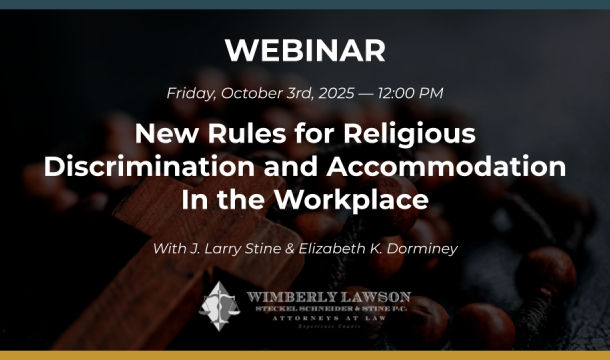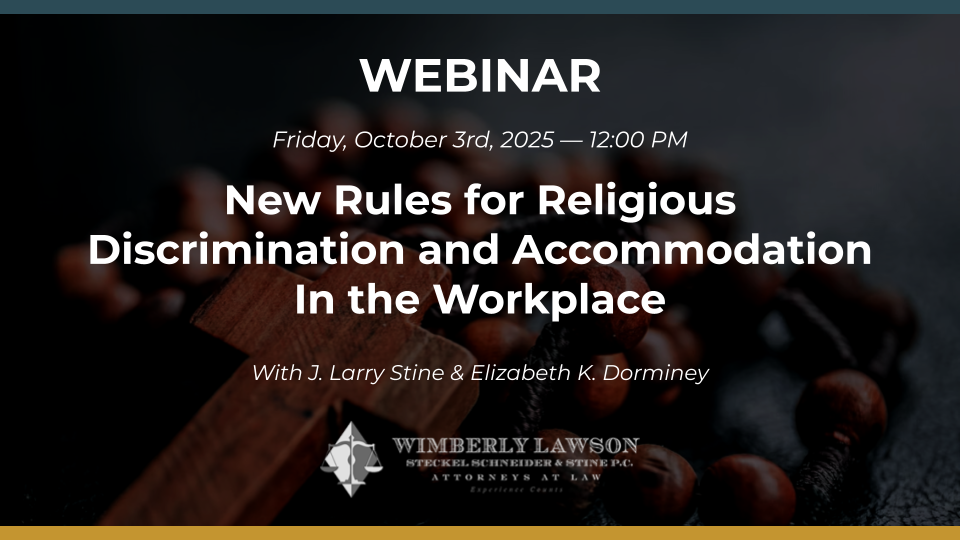Speech and the Workplace, The “Take a Knee” Edition
We have addressed the issue of a private employer's options in responding to employee speech in previous blogs, and the events of this past weekend make the issue even more salient. Putting politics aside, how easy is it for a private (meaning non-governmental) employer to terminate an employee for speech (or protest) in the workplace? Not that easy, unless the employer does not mind getting involved in litigation or arbitration.
Here is an analysis that a private employer should engage in before terminating any employee for speech or protest in the workplace:
- Contract of Employment. Does the employee have a written contract of employment? (Virtually all professional sports players do). If so, what does the contract say about termination? What are the financial consequences of terminating the employee in breach of the contract?
- Collective Bargaining Agreement. Is the employee covered by a collective bargaining agreement (CBA)? (NFL players are). What does CBA say about termination of employees? Most, if not all, CBA's provide that bargaining unit employees can be terminated "for cause." It is probable that the question of whether certain speech or protest is considered "cause" for termination ultimately will be decided by an arbitrator.
- Content of the Speech. Is the employee engaging in speech or conduct that is protected by state or federal law? As we have discussed before, certain employee speech is protected by the National Labor Relations Act or federal anti-retaliation/whistleblower laws. Thus, terminating an employee who engages in protected speech likely will result in a charge and/or lawsuit.
- Protected Classifications/Discrimination. Is the employee in a protected classification? If yes, have "similarly situated" employees who are not in a protected classification been treated differently? Just figuring out who is "similarly situated" is a complicated process.
- The "Intangibles."
- How many employees are involved in the speech or protest? Is it realistic to terminate all of them?
- When considering the termination of individual employees--what is the employee's length of service? Disciplinary history? Performance history? If the matter goes to litigation or arbitration, an employee with a long employment history and little or no discipline and good performance is going to receive much more sympathy.
- Is the employee a leader who is respected by other employees? If so, terminating this employee may adversely impact employee morale and productivity. Furthermore, employees who perceive that the employer is treating them or their co-workers "unfairly" may reach out to a third party, such as the EEOC or even a union.
- Will there be publicity? If so, how will that reflect on the company?
- Is there some other form of discipline, short of termination, that may be more appropriate?
- How many employees are involved in the speech or protest? Is it realistic to terminate all of them?
In short, the decision to terminate any employee is not simple or easy, except maybe in those cases where the employee does something so egregious (i.e., theft, hitting another employee, selling drugs at work, sabotaging equipment, to name a few) that termination is warranted and even expected. In all other cases, it is important for an employer to examine a number of factors before making its decision.

Kathleen J. Jennings is a former principal in the Atlanta office of Wimberly, Lawson, Steckel, Schneider, & Stine, P.C. She defends employers in employment matters, such as sexual harassment, discrimination, Wage and Hour, OSHA, restrictive covenants, and other employment litigation and provides training and counseling to employers in employment matters.
Related Content
Get Email Updates
Recent Content

Trump Nominates Appointments to NLRB and EEOC but Policy Changes Likely to Be Delayed

DOL Launches Self-Audit Programs Designed to Help Employers Improve Compliance

DOL Must Release EEO-1 Reports to the Public under Open Records Laws

Current Advice on Active-Shooter Situations

New Policy for Federal Workers and Religious Expressions

